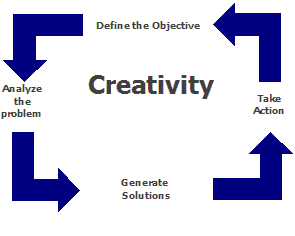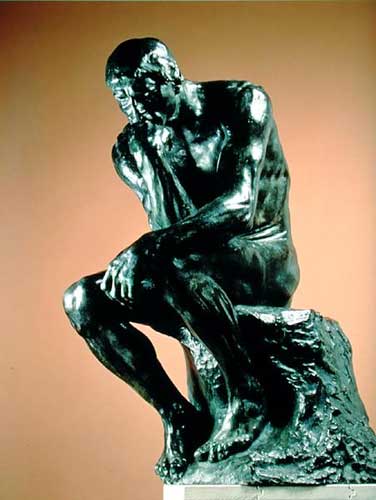 Our ability to be creative can make a tremendous difference in our lives. Many years ago, Earl Nightingale suggested the opposite of courage is not cowardliness but rather conformity. The road taking us away from cowardliness is the road less traveled, the same one where we must be creative because it is usually laden with uncertainty and the unknown. While most of us know that creativity can set us apart from the masses, it can be elusive and difficult to ascertain.
Our ability to be creative can make a tremendous difference in our lives. Many years ago, Earl Nightingale suggested the opposite of courage is not cowardliness but rather conformity. The road taking us away from cowardliness is the road less traveled, the same one where we must be creative because it is usually laden with uncertainty and the unknown. While most of us know that creativity can set us apart from the masses, it can be elusive and difficult to ascertain.
We can talk about four steps used:
- Define the objective
- Analyze the problem
- Generate solutions
- Take action
While these elements are important, there is another element perhaps even more important than all the others. Our belief in our creative power is fundamental if we want to achieve more creativity in our surroundings. The power of our mind has no equal. Some of the wisest men in the world have written about our ability to change our lives by changing our thoughts.
Whatever you can conceive and believe, you can achieve.
~ Napoleon Hill
 A man’s life is what his thoughts make of it.
A man’s life is what his thoughts make of it.
~ Marcus Aurelius
Whether you think you can or think you can’t, you’re right.
~ Henry Ford
Man is buffeted by circumstances so long as he believes himself to be a creature of outside conditions, but when he realizes that he is a creative power and that he may command the hidden soil and seeds of his being out of which circumstances grow; he then becomes the rightful master of himself.
~ James Allen
We can learn techniques to generate ideas, buy software to facilitate the creation of mind maps and we can even meditate about our deepest desires, but until we establish a firm belief in our creative power, we will come up short with any tool that we choose to use. When we sow seeds which confirm that we can be creative, the land becomes fertile to achieve our objectives.
How can we empower creative thought? The answer is different for everybody and there is no magic answer but we can focus on the following:
Read accounts of creative people
Recall creative ideas we have generated
Take time to be alone and to reflect on what we most desire
Recognize all that exists in our world today started with an idea
Realize the creative power our mind possesses through our dreams
Consider the fears, uncertainties, and doubts creating obstacles in our mind
One of the surest ways to empower creative thought is to take the road less traveled, break routine and utilize our mind to create and not conform. Robert Frost eloquently expressed this thought in a famous poem indicating one of the paths towards creativity.
The Road Not Taken
Two roads diverged in a yellow wood,
And sorry I could not travel both
And be one traveler, long I stood
And looked down one as far as I could
To where it bent in the undergrowth;
Then took the other, as just as fair,
And having perhaps the better claim,
Because it was grassy and wanted wear;
Though as for that the passing there
Had worn them really about the same,
And both that morning equally lay
In leaves no step had trodden black.
Oh, I kept the first for another day!
Yet knowing how way leads on to way,
I doubted if I should ever come back.
I shall be telling this with a sigh
Somewhere ages and ages hence:
Two roads diverged in a wood, and I–
I took the one less traveled by,
And that has made all the difference.
~ Robert Frost
Creative power lies within each of us!
∞ Rob McBride ∞
LL I 6
Our ability to be creative is one element that can make a tremendous difference in our lives. Many years ago, Earl Nightingale suggested that the opposite of courage was not cowardliness but rather conformity. The road that takes us
away from cowardliness is the road less traveled. The creative road, e road which is laden with uncertainty and the unknown. While most of us know that creativity can set us apart from the masses, it can be elusive and difficult to ascertain.
We can talk about the steps which have been proposed to lead us down the creative path. For example:
- Define the objective
- Analyze the problem
- Generate solutions
- Take action
While these elements are important, there is another element which is perhaps even more important than all others. Our belief in our creative power is fundamental if we want to achieve more creativity in our surroundings. The power of our mind has no equal. Some of the wisest men in the world have written about our ability to change our lives by changing our thoughts.
Whatever you can conceive and believe, you can achieve.
~ Napoleon Hill
A man’s life is what his thoughts make of it.
~ Marcus Aurelius
Whether you think you can or think you can’t, you’re right.
~ Henry Ford
Man is buffeted by circumstances so long as he believes himself to be a creature of outside conditions, but when he realizes that he is a creative power and that he may command the hidden soil and seeds of his being out of which circumstances grow; he then becomes the rightful master of himself.
~ James Allen
When we sow seeds which confirm that we can be creative, the land is fertile to achieve our objectives. We can learn techniques to generate ideas, buy software which facilitate the creation of mind maps and we can meditate about our desires but until we establish a firm belief in our creative power we will come up short with any tool that we choose to use.
How can we empower creative thought? The answer is different for everybody and there is no magic answer but we can focus on the following:
Read accounts of creative people
Recall creative ideas that we have generated
Take time to be alone and to reflect on that which we most desire
Realize the creative power our mind possesses through our dreams
Recognize that all that exists in our world today started with an idea
Consider the fears, uncertainties and doubts that create obstacles in our mind
One of the surest ways to empower creative thought is to take the road less traveled, break routine and utilize our mind to create and not conform. Robert Frost eloquently expressed this attitude in a famous poem which indicates one of the paths towards creativity.
The Road Not Taken
Two roads diverged in a yellow wood,
And sorry I could not travel both
And be one traveler, long I stood
And looked down one as far as I could
To where it bent in the undergrowth;
Then took the other, as just as fair,
And having perhaps the better claim,
Because it was grassy and wanted wear;
Though as for that the passing there
Had worn them really about the same,
And both that morning equally lay
In leaves no step had trodden black.
Oh, I kept the first for another day!
Yet knowing how way leads on to way,
I doubted if I should ever come back.
I shall be telling this with a sigh
Somewhere ages and ages hence:
Two roads diverged in a wood, and I–
I took the one less traveled by,
And that has made all the difference.
~ Robert Frost
Creative power lies within each of us!
∞ Rob McBride ∞
LL I 6
 La vida es cíclica y estamos en una montaña rusa de constantes emociones. Mientras viajamos por la montaña rusa de la vida, sentimos una variedad de emociones y sentimientos. Comenzando el viaje, estamos llenos de emoción y entusiasmo. Aprendemos y crecemos mientras iniciamos la subida de una pendiente fuerte que frecuentemente se interrumpe por vueltas inesperadas. Mientras estamos encaminados hacia nuestro objetivo, sentimos la excitación y el éxtasis de lo que está por venir.
La vida es cíclica y estamos en una montaña rusa de constantes emociones. Mientras viajamos por la montaña rusa de la vida, sentimos una variedad de emociones y sentimientos. Comenzando el viaje, estamos llenos de emoción y entusiasmo. Aprendemos y crecemos mientras iniciamos la subida de una pendiente fuerte que frecuentemente se interrumpe por vueltas inesperadas. Mientras estamos encaminados hacia nuestro objetivo, sentimos la excitación y el éxtasis de lo que está por venir. cúspide de lo que hemos esperado durante mucho tiempo. Por supuesto es la realización de algo increíble. Sin embargo, es solamente el comienzo. Al estar en la cima, vemos el panorama de todas las posibilidades. Pensamos en todas las cosas maravillosas que nos ofrece la vida.
cúspide de lo que hemos esperado durante mucho tiempo. Por supuesto es la realización de algo increíble. Sin embargo, es solamente el comienzo. Al estar en la cima, vemos el panorama de todas las posibilidades. Pensamos en todas las cosas maravillosas que nos ofrece la vida. Cuando llegamos abajo, percibimos una serie de emociones; alivio, excitación, emoción y anticipación. Empezamos a preguntarnos si el espectáculo ha terminado o si aún tenemos otra oportunidad de seguir en el rumbo maravilloso.
Cuando llegamos abajo, percibimos una serie de emociones; alivio, excitación, emoción y anticipación. Empezamos a preguntarnos si el espectáculo ha terminado o si aún tenemos otra oportunidad de seguir en el rumbo maravilloso. Cuando el ciclo de la vida nos lleva abajo, tenemos que tomar una decisión. ¿Nos mantendremos abajo o rebotaremos para dar todo lo que está en nuestro poder? Todos tenemos el poder de dominar nuestros pensamientos lo que al final define nuestras acciones. Nuestra mente puede iniciar una nueva subida o puede perdurar en el por que.
Cuando el ciclo de la vida nos lleva abajo, tenemos que tomar una decisión. ¿Nos mantendremos abajo o rebotaremos para dar todo lo que está en nuestro poder? Todos tenemos el poder de dominar nuestros pensamientos lo que al final define nuestras acciones. Nuestra mente puede iniciar una nueva subida o puede perdurar en el por que.




 Nuestras vidas están constantemente cambiando y evolucionando. Frecuentemente, estos cambios implican estrés y preocupación. He aquí una forma de ver la vida, sobre la cual he estado trabajando, que nos puede ayudar a dar la bienvenida al cambio.
Nuestras vidas están constantemente cambiando y evolucionando. Frecuentemente, estos cambios implican estrés y preocupación. He aquí una forma de ver la vida, sobre la cual he estado trabajando, que nos puede ayudar a dar la bienvenida al cambio. ramas de los árboles y parecen hilos de seda que atan los árboles a la tierra. El viento susurra en hojas que bailan con ráfagas ligeras.
ramas de los árboles y parecen hilos de seda que atan los árboles a la tierra. El viento susurra en hojas que bailan con ráfagas ligeras.
 There is an e mail message written by an anonymous author that I have received several times over the last few years. The message is powerful and surely, many have received it. The title is The Difference. Nevertheless, it leaves unanswered a very important question.
There is an e mail message written by an anonymous author that I have received several times over the last few years. The message is powerful and surely, many have received it. The title is The Difference. Nevertheless, it leaves unanswered a very important question.


 personas. ¡La Actitud es la diferencia que hace una gran diferencia!
personas. ¡La Actitud es la diferencia que hace una gran diferencia! Often it is an exercise which we perform mentally during the holidays. We have the best intentions and when we are creating our ideal year, it sounds easy and we are excited about the prospects of the coming year. We return to work and start back on our routine and, in many cases, it’s like waking up after a night of too much eating and drinking.
Often it is an exercise which we perform mentally during the holidays. We have the best intentions and when we are creating our ideal year, it sounds easy and we are excited about the prospects of the coming year. We return to work and start back on our routine and, in many cases, it’s like waking up after a night of too much eating and drinking.  The “hangover” that we wake up to is accompanied by work that has accumulated during time off. We think, “This is crazy! What was I thinking about when I made these new resolutions and goals?” If we don’t accompany our goals and objectives with action, it is likely that the wonderful thoughts we have will become nothing more or less than an unaccomplished dream.
The “hangover” that we wake up to is accompanied by work that has accumulated during time off. We think, “This is crazy! What was I thinking about when I made these new resolutions and goals?” If we don’t accompany our goals and objectives with action, it is likely that the wonderful thoughts we have will become nothing more or less than an unaccomplished dream.

 Our ability to be creative can make a tremendous difference in our lives. Many years ago, Earl Nightingale suggested the opposite of courage is not cowardliness but rather conformity. The road taking us away from cowardliness is the road less traveled, the same one where we must be creative because it is usually laden with uncertainty and the unknown. While most of us know that creativity can set us apart from the masses, it can be elusive and difficult to ascertain.
Our ability to be creative can make a tremendous difference in our lives. Many years ago, Earl Nightingale suggested the opposite of courage is not cowardliness but rather conformity. The road taking us away from cowardliness is the road less traveled, the same one where we must be creative because it is usually laden with uncertainty and the unknown. While most of us know that creativity can set us apart from the masses, it can be elusive and difficult to ascertain.
 A man’s life is what his thoughts make of it.
A man’s life is what his thoughts make of it.